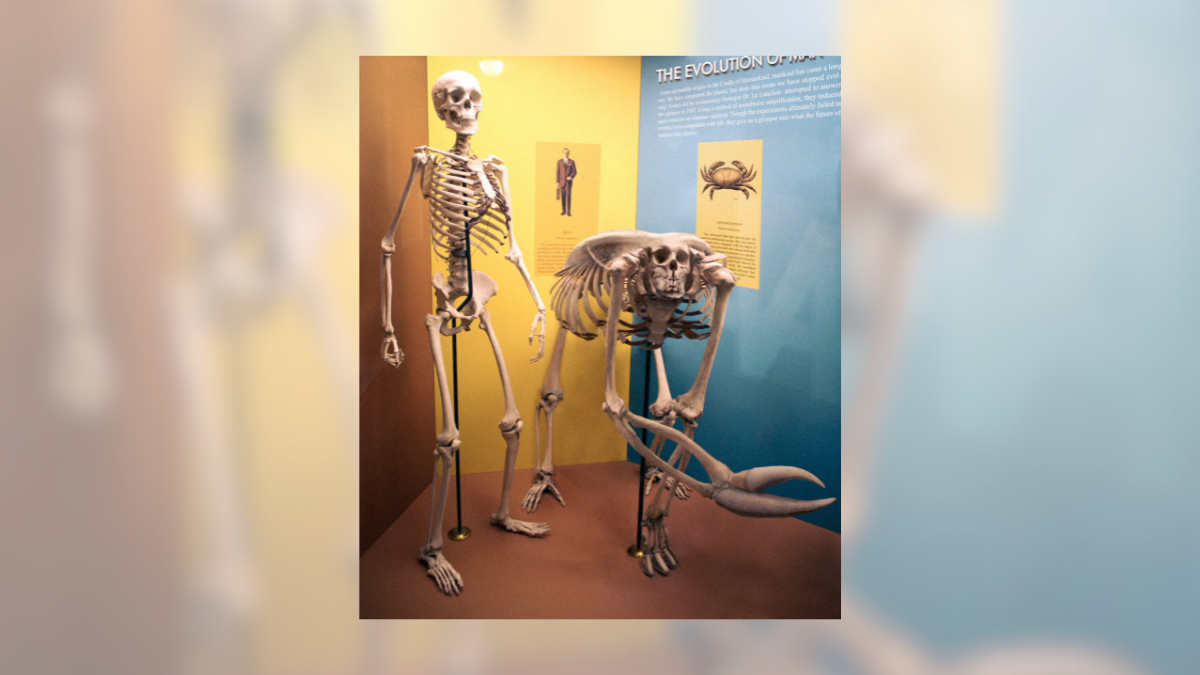Since 2021, a photograph that claimed to show a "crab-like" human skeleton recovered from the "Le Lanchon experiments on human evolution" has circled some corners of the internet, prompting both skepticism and belief over the supposed figure created to "accelerate the development of mankind."
The claim resurfaced again in an Aug. 23, 2023, post (archived here) on X that included what appeared to be a photograph showing an average-shaped human skeleton positioned next to a huge "crab-like form" with a large pincer, hunched back, and elongated limbs:
Skeleton recovered from the Le Lanchon experiments on human evolution. In these tests, volunteers were subjected to procedures to "accelerate the development of mankind". No subject is recorded to have survived. Their crab-like form is thought to be an instance of carcinization. pic.twitter.com/JYB1ZrIUYt
— Eduardo Valdés-Hevia 👁️ (@Valdevia_Art) August 23, 2023
The image above was initially so believable to some users on the social media platform that it prompted an Aug. 25, 2023, community note (which was deleted at the time of this publication). That note included a link directing users to a 2022 study that described malingering, a psychotic disorder that manifests as the "intentional production of false or grossly exaggerated physical or psychological symptoms motivated by external incentives."
 (Screengrab/X)
(Screengrab/X)
One iteration of the claim blamed the supposed evolved crab-human on a process known as carcinization, which is a genuine evolutionary theory of how non-crab-like forms become crab-like. And this form of convergent evolution happens quite often – just not in humans.
However, the photograph was not authentic – it was simply an art project.
After scanning through comments on the post above, Snopes found the original poster, Eduardo Valdés-Hevia, whose X bio stated that he makes "spooky images on Photoshop." He wrote on Aug. 23, 2023, that the crab-like human was part of an art project, and he had "made it with photoshop!"
// Getting confused people in the comments so let me make it clear for new folks: this is an art project, I made it with photoshop!
And if you like that kind of stuff, there's lots more where that came from!
Here's the best place to browse through my art: https://t.co/Ug6ERfPklx pic.twitter.com/8UcjlQLZBK— Eduardo Valdés-Hevia 👁️ (@Valdevia_Art) August 23, 2023
Snopes contacted Valdés-Hevia to learn more about his artwork.
In an email, the artist confirmed that he had originally created the "living crab man" in November 2021 and posted a livestream as he made it in 2022. Again in 2023, Valdés-Hevia shared the image on X, at which point it was given a "new wave of attention."
"This time, [the image] got a quite controversial community note (it's gone now, but here's a thread with a screenshot of it and some context as to why I and many folks considered it disrespectful)," Valdés-Hevia wrote in an email.
"I'm no stranger to getting a community note when a post goes particularly viral, but this one was plainly inaccurate and claimed things like this can induce paranoia while linking to a completely unrelated article about psychiatric patients feigning symptoms. After other community note contributors intervened, though, it got removed."
A link to Valdés-Hevia's webpage was also included in his bio on X. The art installation, which was titled on the site, "Human Evolution Experiments," was satirically described as:
Skeleton recovered from the Le Lanchon experiments on human evolution. In these tests, volunteers were subjected to procedures to "accelerate the development of mankind". No subject is recorded to have survived. Their crab-like form is thought to be an instance of carcinization.
This photograph is one of the few remaining images of the volunteers while they were still alive.
The subjects developed a compact and efficient shape, with a defensive ribcage shell and a keratinous claw. Most traces of human intelligence were lost in the process.
Snopes previously debunked other art created by Valdés-Hevia that went viral, sometimes under the false premise that the images were authentic, including a supposed photo that showed a mermaid discovered in 1918 along a Nova Scotia river. Our newsroom also profiled the Spanish artist in 2021 as part of an exploration of turning photography into folklore.

